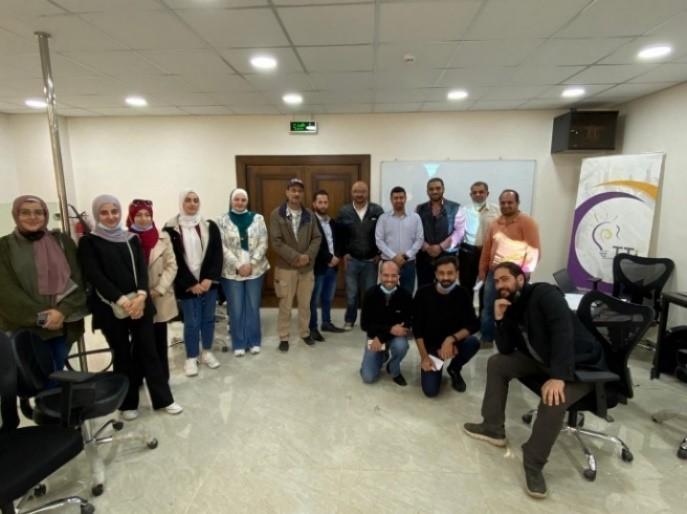MED-InA in Jordan will provide incubation and support for 4 circular economy projects

Part of MED-InA’s ambition is to include the private sector and its creative potential in the Zero Waste efforts of its 3 pilot cities, among which the Greater Irbid Municipality in Jordan. To this end, the American University of Beirut, in charge of this matter, launched a tender and selected one incubator in each pilot city. In Jordan, the winner was TTi, a non-profit organisation that works on spreading entrepreneurship and innovation culture among youth and women living in disadvantaged communities.
What were the first steps to identify promising projects for circular economy in Irbid?
TTi launched a call for projects and ideas (September-October 2021), and received an incredible number of 282 applications! After going through this huge number of proposals, TTi selected 12 finalists and invited them to a pre-pitching orientation session on November 17, with the objective of enhancing their presentation skills and letting them become more familiar with the evaluation criteria for the final pitching event.
The session was entitled “Idea Pitching Skills”, and started with each applicant introducing themselves, before a presentation of project MED-InA and its next phases. Then, candidates were presented with the evaluation criteria they had to meet, and given a business model template to fill in, helping them identify their project outlines, the most important do´s and don’ts, and the basic structure for their pitching. The candidates rehearsed their 5-minute presentations, and 4 of them experimented with presenting their project or idea, focusing on covering the most important points in less than 5 minutes.
This session was followed by one week of online support to applicants preparing their pitching: TTi helped them improve their pitching template and visuals by having their team do a quick review and provide the candidates with constructive feedback.
On November 24, the pitching event took place at the Greater Irbid Municipality Training Centre, with the jury members being:
- Dr Alain Daou (American University of Beirut)
- Eng. Reham Jammal (Greater Irbid Municipality)
- Belal Raslan (TTi)
How was the pitching event structured and how did it go?
Candidates had up to 5 minutes to pitch their idea, followed by a 5-minute Q&A session with the jury. The selection was made according to 3 main variables: the pitching score (details below), the ability to create outcomes during the 3-month incubation period, and the Irbid Municipality needs and priorities.
The pitching scores were established following a detailed evaluation grid, which includes 10 criteria each rated “Low”, “Medium” or “High”:
- Problem/Need: is the problem or need clearly identified and significant to the target group or customers?
- Relation to circular economy: is the solution related to the concept of circular economy?
- Value proposition/Solution: why is the proposed solution unique? Is it faster, cheaper, simpler, of higher quality, more efficient, more focused, etc.?
- Target market: is the target market well defined and specific (large, growing, niche…)?
- Team: is the applicant background or any of their team members/partners relevant to the idea and do they fulfil the business need?
- Revenue model: does the idea have a clear product/service sellable to an identified target group/customers? Are there any alternative revenue streams?
- Readiness to sell: will the business be able to sell during the incubation period (time-to-market average)?
- Financial projections: are the financial projections realistic and promising (based on the number of customers/units, reasonable market penetration, realistic margins, scalability)?
- Personal skills: presentation skills, body language, accepting feedback and criticism
- Expert judgement: subjective impression of the jury members.
After the pitching presentations, the jury held a final meeting to determine the winners of the sub-grants…
Which projects did the jury select?
- 1st place winner of the startup category (10 000€): Project “Teenah” (Raneem Al Meqbel): affordable custom printed quality bags produced with impact by Syrian refugee women and women from their host communities. The jury appreciated the fact that this startup ticks several boxes important for local development in Irbid: women employment, eco-friendly products, exports…
- 2nd place winner of the startup category (5 000€): Project “Ghoorcom” (Mohammad Oqeili): an online marketplace that connects farmers to businesses directly. Mr Oqeili’s pitching was very convincing, as he showed great assurance on how to run his business and how to deal with diversified stakeholders, and the proposed service is particularly useful.
- 1st place winner of the ideas category (10 000€): Project “Remal Al Dhahab” (Reham Almughrabi): vermicompost, creating resources from waste and converting organic waste into materials that are beneficial to the environment. This idea is valuable and new in Jordan, and deserves incubation services (training, mentoring and networking) to be run and managed as a business.
- 2nd place winner of the ideas category (5 000€): Project “Ivvest” (Abdel Rahman Alzubaidi): using science and technology (hydroponics and IoT) to produce the purest, tastiest, healthiest, and pesticide-free leafy greens. This pitching was made online as Mr Alzubaidi was abroad at the time, but its concept struck the jury as complete, adequate and timely: Ivvest mixes creativity, innovation and knowledge of business management, for a promising future!
Project MED-InA will interview these 4 winners in early 2022, as the next step for them is an incubation/support phase (mentoring and training by TTi) to help them bring their projects to fruition!







